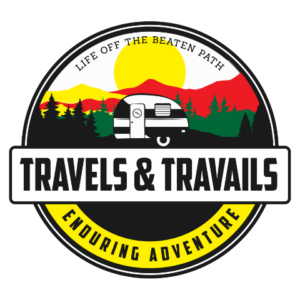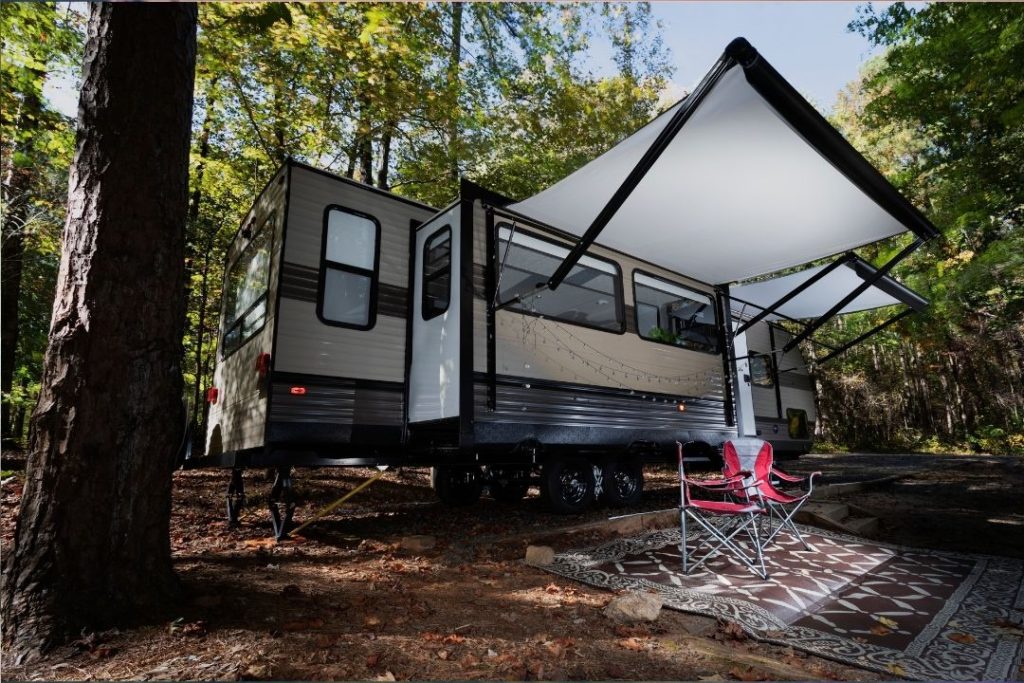
Travel trailers are the most popular RV in the US. In 2021, 56% Of all RVs sold were travel trailers, so it’s understandable why you might want one too.
There are a few considerations before choosing a travel trailer:
- Tow Vehicle & Tow Rating
- Trailer Size
- Amenities
- Budget
- Quality
Tow Vehicle
Before you consider purchasing a travel trailer, you need to determine how you will tow it. If you already have a tow vehicle, you’ll need to check your vehicle tow rating. That way, you’ll know how much weight your tow vehicle can tow.
What is Tow Rating?
Tow rating or towing capacity is the maximum amount of weight your vehicle can tow. This is an important safety consideration. You never want to tow more than your maximum tow rating.
How Do I Find Out My Tow Rating?
You can find your tow rating or towing capacity in the vehicle’s owner’s manual.
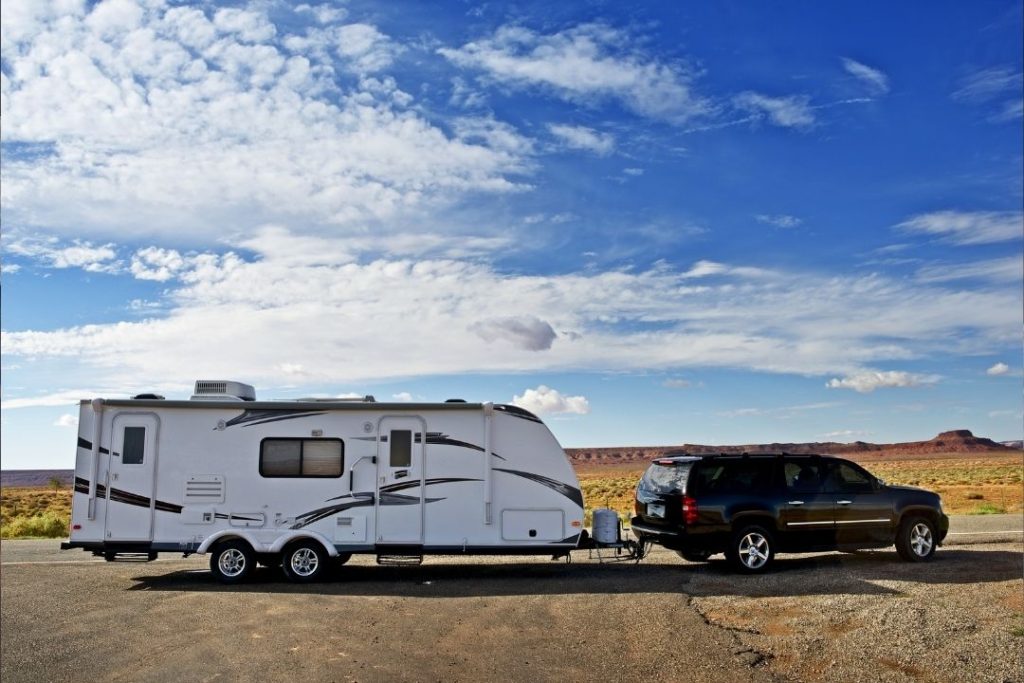
Trailer Size
There are several reasons why trailer size is important. The first consideration relates to your tow vehicle. It’s imperative that you choose a trailer that is compatible with your tow vehicle or at least have an idea which type of vehicle you can tow with the trailer size you are looking for. In addition, you’ll want to choose a trailer that is large enough for the people who will be occupying the trailer.
Trailer Size and Tow Vehicle
There are several factors that come into play when discussing which vehicle will tow which trailer. The first, and most common, is gross vehicle weight rating (GVRW). GVRW is the maximum amount of weight for your trailer and the cargo. It includes the weight of the trailer dry (dry weight) and the weight of all the tanks when full and all the cargo that you pack for a trip. The GAWR is posted on your trailer’s VIN label, which you can find either on the driver’s side of newer trailers or on the tongue of older trailers.
There are other factors to consider such as tongue weight and payload, but as a general rule, most people feel comfortable towing at 80% of the gross vehicle weight rating.
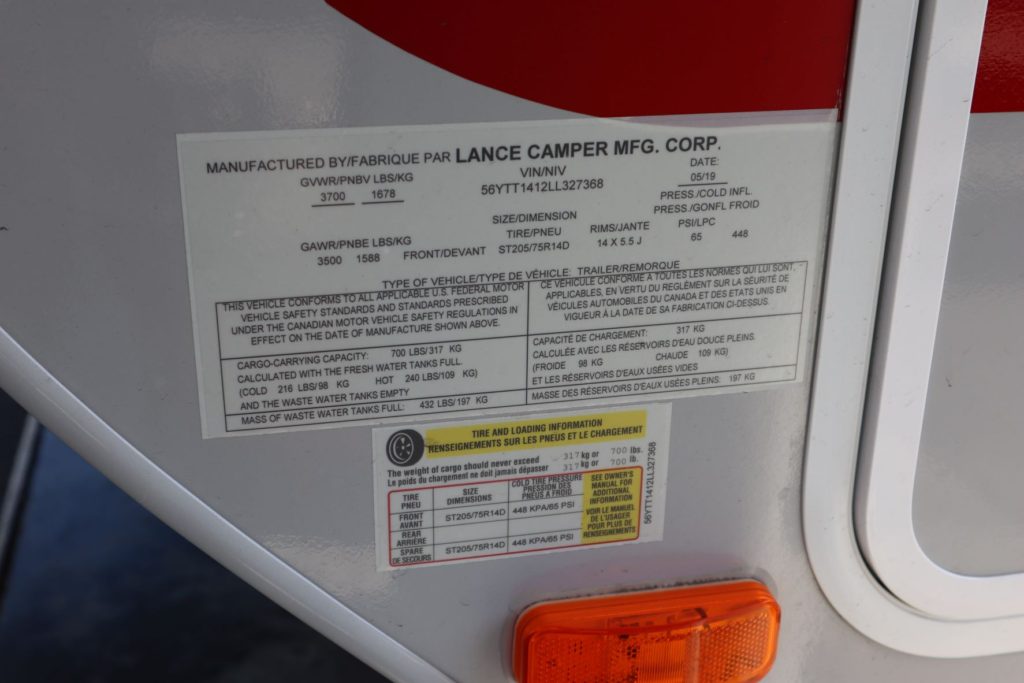
Now, if you already have a tow vehicle, you’ll want to make sure to buy a trailer that has a GVWR lower than the tow capacity of the tow vehicle. The tow capacity on my 2013 Venza is 3500 lbs., so I could definitely not tow the Lance trailer on the photo listed above, because the GVWR for this Lance trailer is 3700 lbs.
NEVER take the RV dealer’s word about a tow vehicle. I have heard so many stories about people who were sorely disappointed when they discovered that their tow vehicle could not adequately tow their new trailer. Just yesterday, a woman in a Facebook group reported that the dealer said that her tow vehicle could tow the trailer he was selling her. Sadly, he either did not know or lied. Now she has a trailer that she can’t pull uphill because her current tow vehicle doesn’t have enough power.
Choosing a Trailer to Fit Your Family
In step with considering the choice of the tow vehicle, you’ll want to consider the size of the trailer that will fit your family. Travel trailers come in so many sizes! The best way to choose the right size travel trailer is to rent one. There are many RV rental companies like Outdoorsy and RV Share.
What is the Smallest Travel Trailer?
While the Timberleaf Pica, a teardrop trailer, is the smallest trailer at 12′ long and 5′ wide, the Scamp 13 and the Happier Camper HC1 are two trailers that you can stand up in and both come in at 13 feet. Scamp 13 has the advantage of having a bathroom with a shower. If you’re looking for a travel trailer that you can tow with a smaller vehicle, check out these options.
What is the Largest Travel Trailer
The Jayco Jayflight 38BHDS is the largest travel trailer. At 40′ 6″ long, this trailer sleeps up to 14 people! The longest travel trailer is the Jayco Jayflight Bungalow 40DLFT. At 41′ 7″, this trailer sleeps 5-7 people.
The Trailer for You
You’re probably not looking for the largest or smallest trailer on the market, so what should you consider in looking for a trailer? The reason why size is so important, tow vehicle aside, is that it has to fit the needs of your family.
The most important consideration is the number of beds or sleeping areas. You’ll need to have enough beds for everyone in your family. You’ll also want to consider the types of beds in the trailer. For example, if the dinette converts into a bed, and you’ll be using it as a bed, you will have to convert it back from a sleeping area to a dinette come morning. This is an inconvenience. However, if you are eating outside the whole time, it may not matter or may only matter during inclement weather.
All beds are not created equal. Some sleeping areas may only be suitable for children or small adults. If the dinette is compact, it may not be long enough for full-sized adults. And, some bunk beds have weight limits. For example, the weight limit on the top bunk of a Casita Heritage trailer is 100 lbs., which is only suitable for a child or small adult.
Another consideration is the living area of the trailer. You’ll want to consider how livable the trailer will be in the worst-case scenario, like when there is inclement weather. Is there enough room for everyone to move about while you are cooking dinner? Does everyone have a comfortable place to sit?
Another consideration in regard to size is tank capacity. If you plan on being a weekend warrior at an RV park, this might not be an issue, but if you are planning a three-week vacation that includes long stretches of camping in areas where you will not have access to water or septic, you’ll defiantly want to consider tank sizes.
Amenities
Amenities are as numerous as the trailer themselves. Here are some options that you might consider:
- Wet bath vs. dry bath
- Floorplans
- Solar and battery size/type
- Kitchen and kitchen appliances
- Trailer seasonality (2 vs 4 season)
- Mattress size/comfort
- Storage space
Wet Bath vs Dry Bath
So, what is the difference between a wet bath and a dry bath? A wet bath is a bathroom that contains both the toilet and the shower in one enclosure. Wet baths are common in small trailers where space is a premium. The disadvantage of having a wet bath is that the toilet gets wet when you take a shower. A dry bath is a bathroom that has a separate enclosure for the toilet from the shower. A dry bath can be a bathroom with a sink and toilet that has a separate shower enclosure. Less commonly, a dry bath can have two separate rooms, one for the toilet and sink and one for the shower.
Floor Plans
You’ll want to choose a floor plan for the way you want to camp. For example, many people like to travel with ATVs and motorcycles. If you like to travel this way, then a toy hauler would be a great RV for you. If you have kids and they like their own space, you’ll want to choose a trailer with a bunkhouse.
Slide-outs or slides make a trailer larger. This is a great advantage when you are camping. However, keep in mind that when you put your slides in for towing, you may not have access to some important areas in your trailer, like the refrigerator or bathroom. We use our trailer while on the road for both bathroom breaks and to make quick meals, like lunch. Having a slide block in the refrigerator or bathroom would be a large disadvantage.
You might want a front or rear bedroom. You may consider a rear dinette with a window so you can look out over your camping area while dining or relaxing.
Solar and Battery Size/Type
If you like to get off the beaten path, as we do, consider a trailer that has roof-top solar or at least a solar port to plug in a suitcase or mobile-style solar panel. There are advantages and disadvantages to both styles. With roof-top solar, you won’t have to babysit the solar panels like you would with a mobile solar panel system. You don’t have to worry about someone walking off with them, and you don’t have to move them with the sun. The disadvantage to roof-top solar is that, if you park your trailer in the shade, you won’t have access to the sun. And, you don’t have the option to move them around to follow the sun like you do a mobile solar panel.
Travel trailers normally come with three different battery types. Lead acid batteries are not very common anymore in newer travel trailers due to the upkeep and maintenance. AGM batteries are the most common type of battery that you’ll see in newer trailers. While they require little maintenance, they are don’t have the largest total power capacity of the batteries available – that honor goes to the lithium battery. However, lithium batteries are more expensive than AGM or lead-acid batteries. If you are planning on camping in areas where you have hookups, an AGM battery will certainly meet your needs. But if you plan on camping without hookups, and you also have solar to power the batteries, lithium is a better choice.
Kitchen and Kitchen Appliances
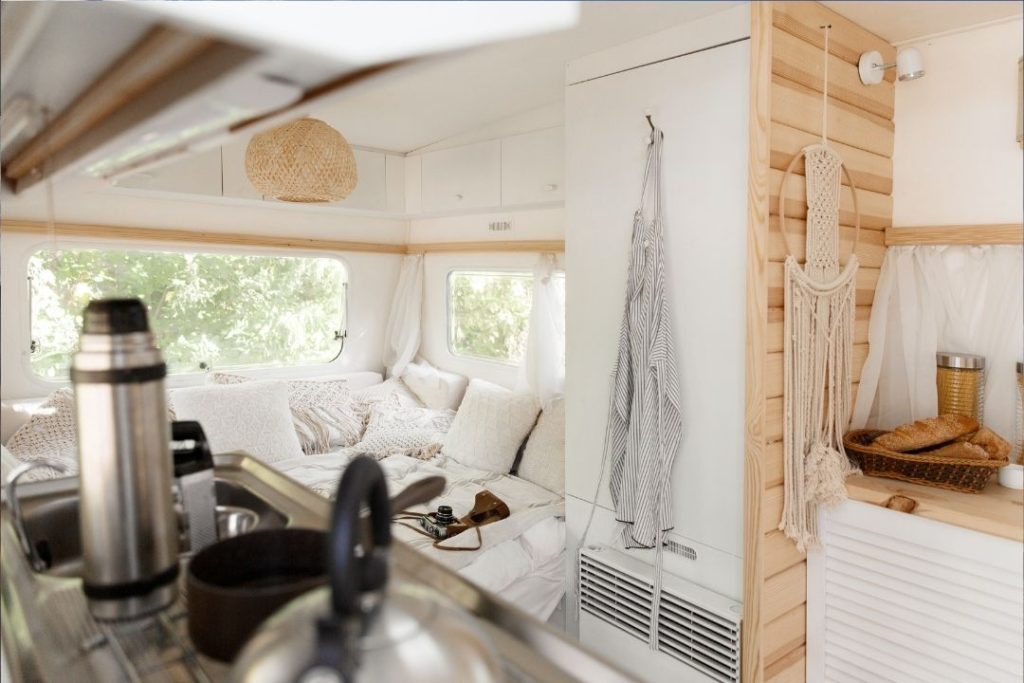
If you like to cook or have to cook, the kitchen will be an important area in your trailer. Consider the size of the kitchen. Like I mentioned before, you’ll want a layout and size of the kitchen where you won’t be bumping up against other people as they pass through. Another important consideration is kitchen appliances. Many people consider the size of the sink. Can you fill or wash large pans in the sink? Is the faucet detachable for easy cleaning of the sink and dishes? How about the stove? Are two burners enough for the way you cook or do you need three or four? Do you want a propane stove or an electric one?
One of the biggest considerations in the kitchen, in my option, is the size of the refrigerator. This becomes even more important if you will be camping for longer periods of time. Of course, if you aren’t in a remote location, you can always go shopping. But who wants to go grocery shopping while on vacation? Not me. Refrigerators are normally sized in cubic feet. In a small trailer, you can have a refrigerator as small as 2-3 cubic feet. These small refrigerators normally don’t have a freezer, so that’s something to keep in mind. While a small refrigerator, 2-5 cubic feet is good for a single person or couple, if you have kids, you’ll probably want something larger, especially if you will be camping for a longer period of time. For weekend trips, you may be able to get by with a smaller refrigerator.
Some kitchens come with an oven and in some, an oven is optional. If you love to bake, you’ll want a stove. Keep in mind though, that a stove takes up space that would likely otherwise be allocated from storage. We don’t have an oven so we use the Omnia Stovetop Oven.
Storage is another consideration in the trailer, and certainly in the kitchen. Choose a trailer that has adequate space for your kitchen items, especially if you like to travel with small kitchen appliances like an Instant Pot or Crockpot. Other appliances, like a microwave, may come standard or can be ordered as an option.
Microwaves are a great option if you are hooked up to shore power or have enough battery power to run one. If you camp without hookups and don’t have enough battery power to run your microwave, you won’t use it and it will end up as a small storage cupboard. Speaking of storage, if a microwave is an option, it may be replacing a storage cabinet, so there’s that to consider also.
Trailer seasonality (2 vs 4 season)
If you are a fair-weather camper, a two-season camper might be all you need. If you see yourself camping on the shoulder season, then a three or four-season or multi-season camper might be for you. There are some construction differences between a two-season and 4-season trailer. Here are some features of a multi-season camper:
- Heated Holding Tanks
- High-Density Foam Wall Insulation
- Thermal Pane Windows
- Insulated Water Bay
- Enclosed or Insulated Holding Tanks
- Interior Heat
- Ducted Heat
Mattress Size/Comfort
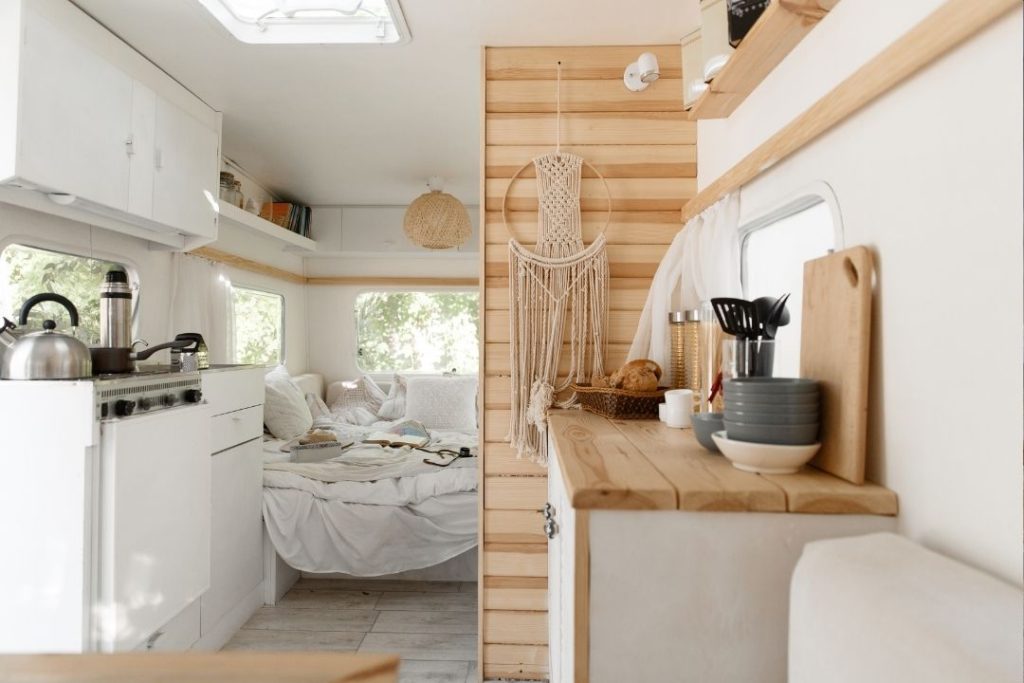
Waking up to a sore back after your first-night camping is no fun. You might be able to squeeze into a smaller size bed than you have at home, but you may not want to. This is your chance to consider sleeping accommodations. If your budget limits you to a smaller trailer, you may have to choose a smaller bed. My husband and I have twin beds that are 30″ wide and I sleep just fine.
Many travel trailers come with custom-sized beds. For example, a trailer may have an “RV Queen” sized bed, which is shorter than a household queen mattress. Here are some common RV mattress sizes.
RVs are notorious for having poor mattress quality. Inquire about the mattress quality for any trailer that you are contemplating buying. Be sure to lay on the mattress to see how it feels. And remember that you can always upgrade the mattress if you find a trailer you love that has an uncomfortable mattress.
Storage Space
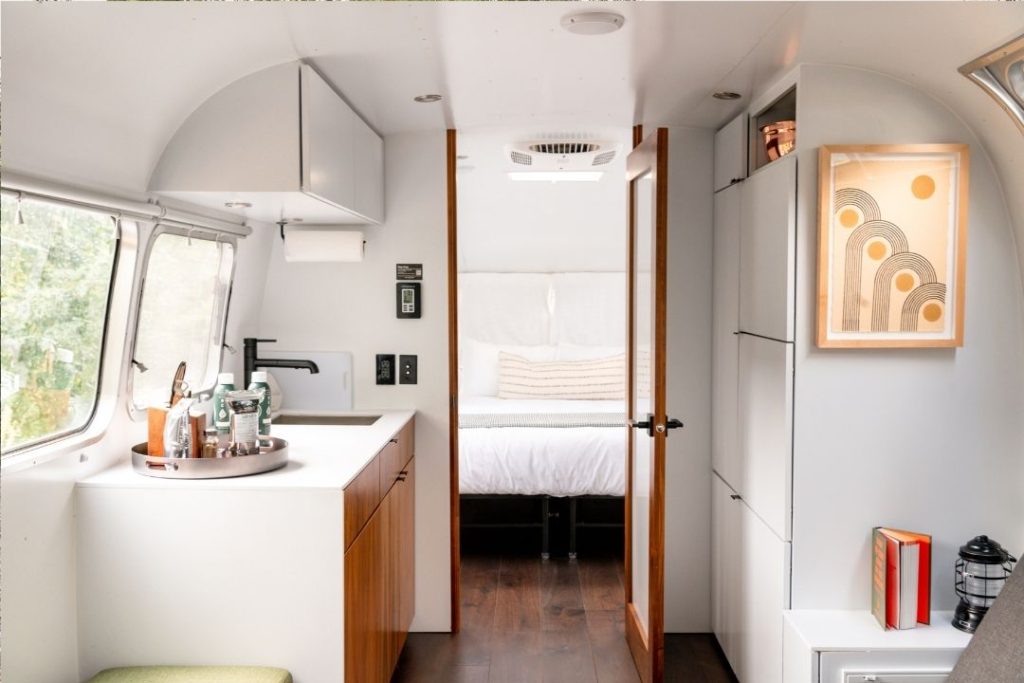
Storage space is more important than you would think. In our tiny trailer, we have very limited storage on the outside of the trailer. We have to make up for this by storing camping items like chairs, tables, etc. in the bed of the pickup truck. This really limits us as to what we can take with us.
When you are researching travel trailers, pay attention to the interior and exterior storage areas. Will all the items you want to take fit? Are the cabinets large enough for the items you’ll bring? Do you have enough drawers?
Budget
If you’re asking, “How much should I spend on a travel trailer?” that’s a great start. But the best question is “how much can you afford?” After you have an understanding of what you want and need in a trailer, you’ll have to put that together with your budget. If you have cash and can pay outright, of course, that’s the best option. However, not many people have that much cash saved for an RV. In that case, you’ll need to know what payment you can afford. RV financing is similar to automobile financing. A simple loan calculator can help you determine what your payment might be. Most RV loans range from 10-15 years.
Quality
Quality is important. If you are financing a trailer, you’ll want it to last the duration of the loan. Recreation Vehicle Dealers Association (RVDA) issues annual quality circle awards. In the 2021 towable category, the travel trailer brand winners were as follows:
- Airstream;
- Cruiser RV
- East to West
- Forest River
- Grand Design
- Heartland RV
- Highland Ridge RV
- Intech RV
- Keystone RV
- KZ RV
- Lance Camper
- Venture RV
- Winnebago
What is the most reliable travel trailer brand?
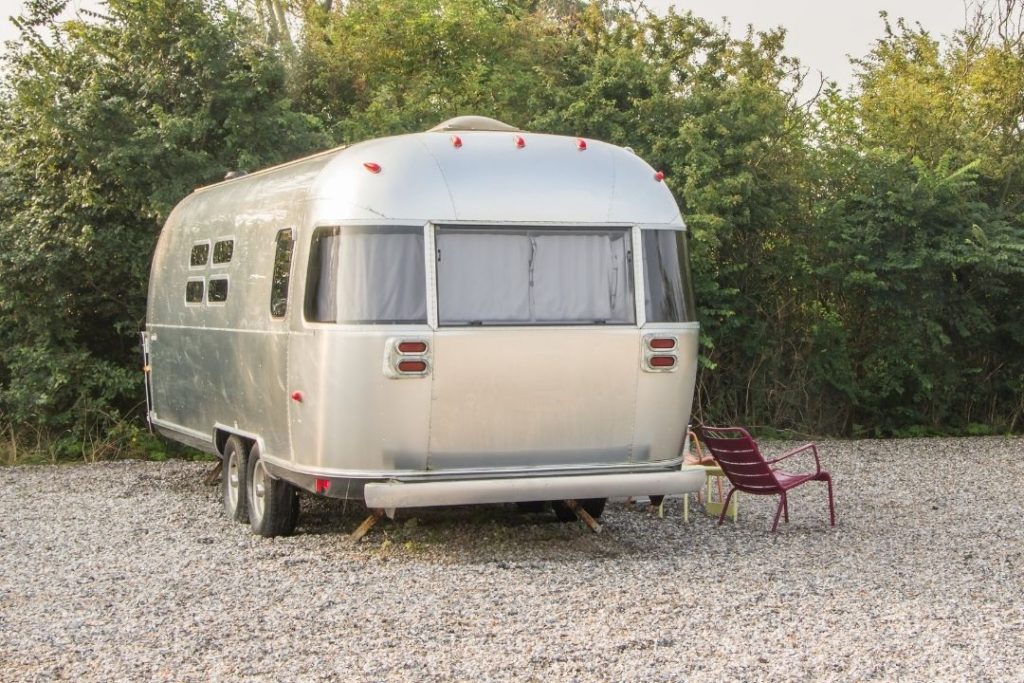
Airstream is the most reliable travel trailer brand. Airstream has won the quality circle award every year since 2012. The quality circle award is given by Recreation Vehicle Dealers Association (RVDA) and is based on the dealer satisfaction index (DSI). The criteria for DSI are reliability/quality, parts, warranty, and sales.
In addition, Airstream won bronze for 2020 from the RV Magazine Readers Choice awards, beat out only by Lance Camper (Gold), and Grand Design (Silver). In 2021, Airstream won two Red Dot awards for design excellence. I’m sure this comes as no surprise. Airstream has a long reputation for building quality, reliable trailers that last decades. The company has been in business since the late 1920s and you can still buy used Airstream trailers that are decades old.
How long Will a Travel Trailer Last?
A good travel trailer will last decades. Airstream, Casita, Escape, and Bigfoot are all 20-year-old travel trailers that still you’ll see for sale now. On average, you can expect a well-cared-for travel trailer to last at least ten years.
Conclusion
While buying a travel trailer is an expensive endeavor, it can provide years of enjoyment for you and your loved ones.
